Review: A Silver Rose, Golden Voices and a Platinum Conductor Mark This Season's ROSENKAVALIER at the Met
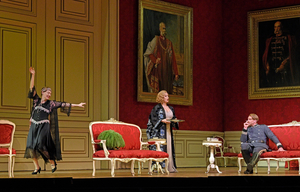
Photo: Karen Almond/Met Opera
For a composer so well known for his dramatic operas--SALOME and ELEKTRA the most famous of them--Richard Strauss's most popular work remains the more comic DER ROSENKAVALIER, which just made its season debut under the scintillating baton of Sir Simon Rattle, with a bevy of first-rate singers.
Rattle found every nuance in some of the composer's most gorgeous music and, unlike many evenings at the opera, the conductor didn't have his eyes buried in the score (or his baton twitching at the second violins) but also on the stage.
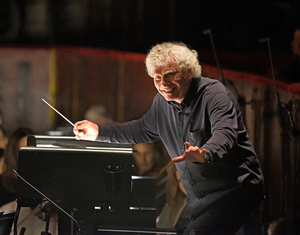
Karen Almond/Met Opera
He clearly let the performers know that he was there, not just for the top-notch musicians of the Met orchestra, but to help bring out the best from the performers, too. (Perhaps, it was because the evening's Octavian was his wife, Magdalena Kozena.) The result was an all-around memorable performance.
Thanks to Robert Carsen's production--that includes Rattle, his cast and orchestra--this time ROSENKAVALIER seemed more farce than an ode to the regrets about the passing of time, as it's often portrayed. It notably gave some new depth to the trio of female voices.
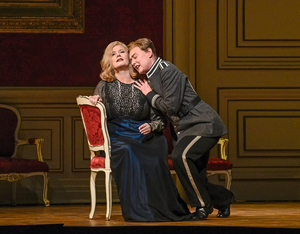
Karen Almond/Met Opera
This included the aging Marschallin (sung sumptuously here by soprano Camilla Nylund, in her Met debut) feeling that her affair with the callow and randy young count Octavian (a pants-role for the luxurious mezzo of Kozena) is coming to an end and the new apple of his eye, the ingenue (but hardly lightweight) Sophie, in the hands of a lovely Golda Schultz, who brought a voice as silvery as the rose presented to her by Octavian as envoy for her intended, the odious Baron Ochs.
Oh, yes, the women sang up a storm--Nylund, in particular, was ravishing, as she had been opposite Jonas Kaufmann in Act II of TRISTAN at Carnegie; her Marschallin was more dignified and less pitiful than some previous productions (and performers) have allowed. But even with the trio of women in peak form, Strauss could have easily retitled the opera (in this take on the work, at least) DER ANGEBER (THE BLOWHARD), thanks to the work of bass Gunther Groissbock as Ochs.
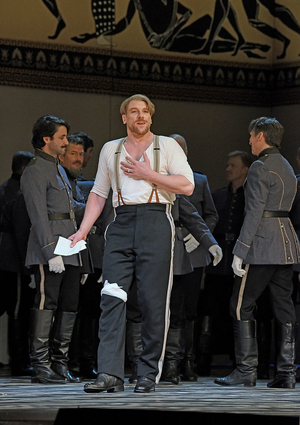
Karen Almond/Met Opera
Frequently portrayed as simply an old letch, here he is a much younger man, with an oh-so-manly swagger. He tore up the stage in every way imaginable--from his great singing to his split-second comic timing, which included the loss of his hairpiece (or having it his slapped back on as the first part of Act III came to its end). Yes, there's that #MeToo aspect to the piece, but it was fun to watch Groissbock get his comeuppance and then some.
Robert Carsen's production with set design by Paul Steinberg (staged here by Paula Suozzi) was sometimes over the top, but it never forgot its task of bringing the classic opera, which premiered in 1911, into our own times...without setting it on a space shuttle. (I wonder what Brigitte Reiffenstuel's gorgeous costumes might have looked like for that setting!) Yes, there was definitely an air of toxic masculinity running through the production, but that was always part of this opera--and Carsen's staging made it seen as ludicrous and vile as could be imagined.
There were a couple of other notables in the cast, making the most of smaller but hardly insignificant roles. Also making a debut was baritone Markus Eiche, as Sophie's rich but social-climbing, suave but crass father Faninal, who made it plain why he happily made his living in munitions manufacture. The always reliable Matthew Polenzani was a delight as the vain, preening Italian Singer (though I can never forget Pavarotti's caricature of himself in the role).
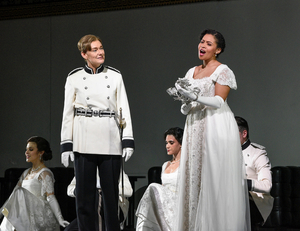
Karen Almond/Met Opera
Tenor Thomas Ebenstein and mezzo Katharine Goeldner were a matched set as the conniving pair Valzacchi and Annina, always ready to make problems for someone--with Baron Ochs their most happy target (for us at least). Finally, soprano Alexandra LoBianco was amusing but solid as Sophie's duenna, Marianne. And, as usual, the Met chorus, under Donald Palumbo, made themselves indispensable.
Surely, with a nearly 4 ½-hour extravaganza there are always quibbles, though more for the composer than the production. For instance, the endless procession of hangers-on who come to kowtow to the Marschallin (that includes the Italian Singer, though singers like Polenzani make it forgivable) could easily have been chopped without losing much. Oh well, never mind--with a ROSENKAVALIER as enjoyable as this one, it's a minor quibble, indeed.
Additional performances of DER ROSENKAVALIER will be heard on December 20, 23, 28, January 1, and the matinee on January 4. A complete schedule with casting by date and performance times is available here.
Add Your Comment
Videos
.png)
